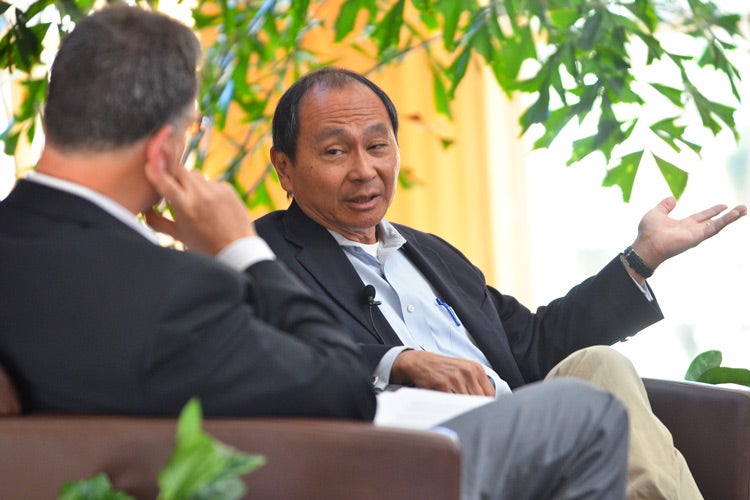|
October 6, 2014
Stanford scholar warns against corruption in democracy
Stanford's Francis Fukuyama argues in a new book that economic growth produces middle classes that in turn demand accountable institutions – the kind that make democracies healthy. But powerful elites can end up controlling those very levers of democracy, leading to the political paralysis evident in some Western societies. By Sarina A. Beges

Francis Fukuyama's new book, 'Political Order and Political Decay,' warns against corruption in democracy. (Photo: Rod Searcey)
Political scientists have long tried to understand why some governments perform better than others.
In a new book, Stanford's Francis Fukuyama examines political institutions – the modern state, the rule of law and accountable government – from the French Revolution to the present day.
Fukuyama, the Olivier Nomellini Senior Fellow at the Freeman Spogli Institute for International Studies, builds on the theories of the late political scientist Samuel Huntington, who argued that political instability comes when government institutions fail to keep pace with social mobilization. In particular, Fukuyama observes that economic development produces middle classes that are often the social basis for democracy.
His book, Political Order and Political Decay, is the second volume in a political history. Fukuyama is the author of the influential 1992 book The End of History and the Last Man, in which he argued that liberal democracy and market economies would emerge as the dominant systems in the post-Cold War world.
Citizen demands for accountability
"Turkey and Brazil, for example, have both been rocked recently by mass protests as their democratically elected governments failed to respond to citizen demands for transparency and better quality services," said Fukuyama, who since 2010 has been based at FSI's Center on Democracy, Development and the Rule of Law.
"And the Arab Spring was triggered by rising expectations of new middle classes in Tunisia and Egypt whose opportunities were blocked by authoritarian regimes," he added.
But there are also tensions and ironies inherent to building a liberal democracy, noted Fukuyama.
Expansion of voting rights in early 19th-century America led to widespread corruption and weakened the quality of government, he said. And while Germany and Japan developed efficient, modern governments under authoritarian conditions, Greece and Italy found state reform difficult to accomplish precisely because the spread of democracy encouraged use of bureaucracy for self-interest. Democracy and good governance can therefore be at odds.
Fukuyama uses China as an example of a strong state with a long history of modern bureaucracy. But this centralized government, combined with a Confucian tradition, has prevented the evolution of legal and democratic institutions to keep the state in check.
He said these historical and cultural factors help to explain why China has evolved into an authoritarian state with successful economic growth but few democratic features – a system that may not be sustainable in the face of social change.
Fukuyama contrasts Asia's long history of political development with Africa, where weak central governments and the experience of colonialism prevented many countries from developing strong state institutions in the wake of independence. This has given rise to the staggering levels of corruption, poverty and governments ill-prepared to contain the rapid spread of diseases, such as Ebola.
Fukuyama said all political orders – including liberal democracies – can decay as a result of ideological rigidity and the capture of state institutions by powerful elites.
Progressive Era and clean government
Fukuyama wrote that both phenomena are evident in the contemporary United States, whose check-and-balance institutions – when combined with intense political and social polarization – have made decision-making extraordinarily difficult.
It's a system Fukuyama calls "vetocracy," and is the subject of the American Democracy Program, a research project he helped launch at Stanford's CDDRL.
Fukuyama leaves readers wanting to know how stalled democracies can get back on track. But many of the solutions only lie in a greater understanding of the historical traps that have held many states back, he said.
"Newly emerging democracies in Tunisia or Ukraine can learn from America's Progressive Era, when a grass-roots movement for clean government succeeded in eradicating corruption in the American political system," Fukuyama said.
His new work picks up where his 2011 book, The Origins of Political Order, left off.
-30-
|